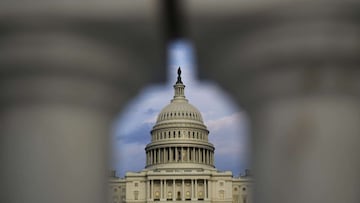Can a Government Shutdown affect Child Tax Credit payments?
With the US government on the brink of collapse, millions of families are wondering if they will see their October Child Tax Credit payment.


Late last week, the White House directed federal department and agency leaders to prepare for a possible shutdown. For many, this involved updating their lapse in allocations “contingency plans,” which outline which functions will continue to be carried out during a government shutdown.
The Treasury Department updated its plans in August, after the debt ceiling suspension passed in 2019, expired. This suspension is one of the key factors driving the government towards a shutdown, as Republicans are steadfast in their opposition to another suspension.
In this week’s #ByeLine, @CapehartJ has words for Congress as the deadline to raise the debt ceiling approaches, saying, “not raising the debt ceiling is a dangerous game of Russian Roulette with our economy.” #SundayShow pic.twitter.com/sIQST1lYXO
— The Sunday Show with Jonathan Capehart (@TheSundayShow) September 26, 2021
What does the plan say about the payment of child tax credit?
Based on the guidance published by the IRS in their contingency plan, it does not seem likely that the October Child Tax Credit payment will be impacted.
There are specific programs and tax credits that Congress provides funding for through the fiscal year, ending on 30 September. Other programs, like Social Security, are paid out of an “indefinite appropriation, and therefore [the IRS] may continue making these payments during a shutdown.”
Similarly, the funds needed to distribute the Child Tax Credit were appropriated under the American Rescue Plan and do not run out after this fiscal year. The IRS states that a certain subset of its workforce will be kept on to ensure that the distribution of payments is not interrupted.
The debt ceiling and the Child Tax Credit
While a government shutdown may not prevent the distribution of the Child Tax Credit payments, the debt ceiling crisis might.
In August, when the suspension to the debt ceiling expired, the Treasury had to begin using its “extraordinary” funds to cover costs until Congress decided if it would suspend, increase, or do away with the debt limit.
In testimony on Capitol Hill this week, Treasury Secretary Janet Yellen warned lawmakers that “Treasury is likely to exhaust its extraordinary measures if Congress has not acted to raise or suspend the debt limit by October 18.”
If the U.S. failed to raise or suspend the debt limit by Oct. 18, the country would default for the first time in history, Treasury Secretary Janet Yellen warned lawmakers on Tuesday, leading to a self-inflicted economic recession and a financial crisis. https://t.co/kKiY2mVM6H pic.twitter.com/I5kW6wbtEZ
— The New York Times (@nytimes) September 28, 2021
Related stories
Without these funds in hand, “Treasury would be left with very limited resources that would be depleted quickly. It is uncertain whether we could continue to meet all the nation’s commitments after that date.” Those commitments include the payment of the Child Tax Credit and many other crucial benefits.
When asked by Ohio Senator Sherrod Brown precisely the impact, this could have on the economy, Sec. Yellen responded by saying it would “have catastrophic economic consequences.” It would represent the first time the United States has ever defaulted on its debt, which “would be disastrous for the American economy, for global financial markets, and for millions of families and workers whose financial security would be jeopardized by delayed payments.” In speaking directly about the Child Tax Credit, the Secretary said, "30 million families who rely on the child tax credit would not receive the monthly payment on time.”
- IRS
- Letras Tesoro
- Condonación deuda
- Deuda externa
- Deuda pública
- Tesoro Público
- Finanzas internacionales
- Congreso EEUU
- Hacienda pública
- Financiación déficit
- Estados Unidos
- Déficit público
- Relaciones económicas
- Norteamérica
- Parlamento
- Finanzas públicas
- Administración Estado
- América
- Relaciones exteriores
- Finanzas
- Administración pública
- Política

